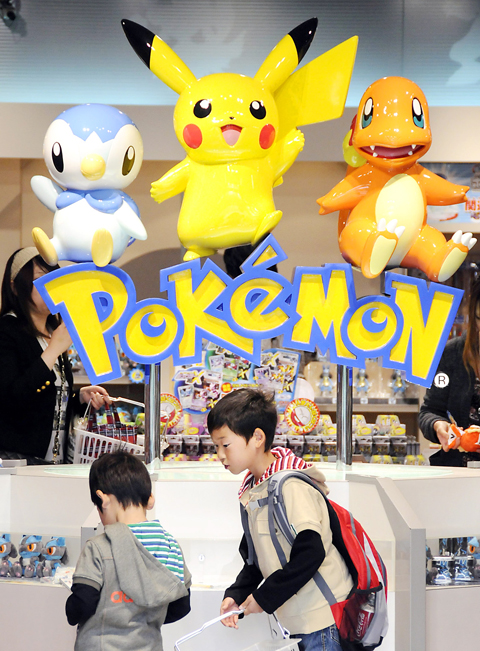Japan’s Nintendo Co bucked the economic gloom yesterday with record profits for the year to March, saying the video game industry was proving to be relatively recession-proof.
The strong results are in stark contrast to the financial woes of most of Japan’s electronics giants, which have been badly hurt by the economic crisis.
Nintendo said its annual net profit rose 8.5 percent to ¥279.09 billion (US$2.8 billion), helped by brisk sales of its Wii and DS consoles — easily beating its own forecast for earnings of ¥230 billion.

PHOTO: AFP
It said the video game industry had been less affected than most by the global economic downturn, despite a drop in consumer spending.
The company’s operating profit increased 14 percent to ¥555.26 billion in the year to March as revenue climbed 9.9 percent to a record ¥1.84 trillion.
Nintendo has enjoyed huge success with its consoles, including the Wii, which aims to appeal to people buying a video game console for the first time.
It has sold 50.39 million Wii consoles worldwide since the launch in 2006, including 25.95 million in the year to March, making it the fastest home video game console to reach the 50 million sales milestone, Nintendo said.
But there are signs that Wii sales are losing some of their luster at home.
An industry survey released last month showed that the rival Sony PlayStation 3 had outsold the Wii in Japan for the first time in 16 months, with sales of the Nintendo console dropping almost two-thirds from a year earlier.
Nintendo president Satoru Iwata admitted recently that the Wii was “in the most unhealthy condition since it hit the Japanese market.”
The video game titan is pinning its hopes on new games and software such as Wii Sports Resort — a sequel to the popular Wii Sports that will go on sale in Japan next month — to energize sales.
The company sold 31.18 million handheld DS machines in the year to March, lifting lifetime sales to 101.78 million units.
It aims to sell 26 million Wii consoles and 30 million DS machines in the current business year to March, helping annual net profits to grow 7.5 percent to a projected ¥300 billion, which would be a record.
But operating earnings are seen slipping 11.8 percent to ¥490 billion and revenue is seen dipping 2.1 percent to ¥1.80 trillion.

MORE VISITORS: The Tourism Administration said that it is seeing positive prospects in its efforts to expand the tourism market in North America and Europe Taiwan has been ranked as the cheapest place in the world to travel to this year, based on a list recommended by NerdWallet. The San Francisco-based personal finance company said that Taiwan topped the list of 16 nations it chose for budget travelers because US tourists do not need visas and travelers can easily have a good meal for less than US$10. A bus ride in Taipei costs just under US$0.50, while subway rides start at US$0.60, the firm said, adding that public transportation in Taiwan is easy to navigate. The firm also called Taiwan a “food lover’s paradise,” citing inexpensive breakfast stalls

TRADE: A mandatory declaration of origin for manufactured goods bound for the US is to take effect on May 7 to block China from exploiting Taiwan’s trade channels All products manufactured in Taiwan and exported to the US must include a signed declaration of origin starting on May 7, the Bureau of Foreign Trade announced yesterday. US President Donald Trump on April 2 imposed a 32 percent tariff on imports from Taiwan, but one week later announced a 90-day pause on its implementation. However, a universal 10 percent tariff was immediately applied to most imports from around the world. On April 12, the Trump administration further exempted computers, smartphones and semiconductors from the new tariffs. In response, President William Lai’s (賴清德) administration has introduced a series of countermeasures to support affected

CROSS-STRAIT: The vast majority of Taiwanese support maintaining the ‘status quo,’ while concern is rising about Beijing’s influence operations More than eight out of 10 Taiwanese reject Beijing’s “one country, two systems” framework for cross-strait relations, according to a survey released by the Mainland Affairs Council (MAC) on Thursday. The MAC’s latest quarterly survey found that 84.4 percent of respondents opposed Beijing’s “one country, two systems” formula for handling cross-strait relations — a figure consistent with past polling. Over the past three years, opposition to the framework has remained high, ranging from a low of 83.6 percent in April 2023 to a peak of 89.6 percent in April last year. In the most recent poll, 82.5 percent also rejected China’s

PLUGGING HOLES: The amendments would bring the legislation in line with systems found in other countries such as Japan and the US, Legislator Chen Kuan-ting said Democratic Progressive Party (DPP) Legislator Chen Kuan-ting (陳冠廷) has proposed amending national security legislation amid a spate of espionage cases. Potential gaps in security vetting procedures for personnel with access to sensitive information prompted him to propose the amendments, which would introduce changes to Article 14 of the Classified National Security Information Protection Act (國家機密保護法), Chen said yesterday. The proposal, which aims to enhance interagency vetting procedures and reduce the risk of classified information leaks, would establish a comprehensive security clearance system in Taiwan, he said. The amendment would require character and loyalty checks for civil servants and intelligence personnel prior to